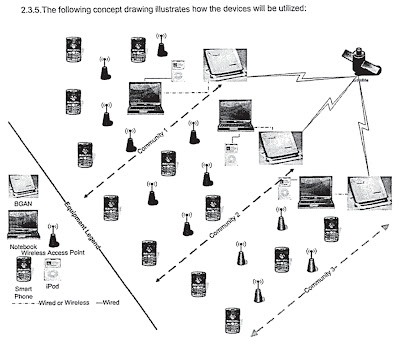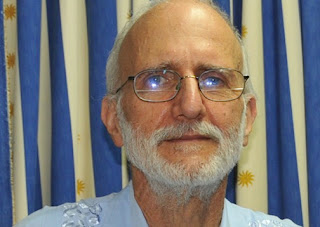 |
| A drawing from a confidential Alan Gross memo |
Cuban Jews had "strategic value" in the democracy project because of their religious, financial and humanitarian ties to the United States, Gross said in an October 2008 memo filed this month in U.S. District Court.
Jewish synagogues were a "secure springboard through which information dissemination will be expanded," Gross wrote in the 27-page memo to his former employer, DAI, a federal contractor in Bethesda, Md.
The memo and other documents filed this month in U.S. District Court give new details about the original scope of the multimillion-dollar project, which was designed to go far beyond helping Jews connect to the Internet as the State Department has repeatedly suggested.
Gross, 63, and his wife, Judy, are suing DAI for $60 million, saying that the contractor failed to prepare Gross for his risky mission, resulting in his capture in 2009. DAI has denied the accusation and says it isn't to blame for the subcontractor's jailing.
 |
| Alan Gross |
His 2008 memo said U.S.-based humanitarian organizations that take computers and other supplies to Jews in Cuba could be useful in DAI's democracy project. One possible implication is that these groups could be used, perhaps unwittingly, to shuttle equipment to Cuba, although Gross doesn't explain in detail what he had in mind.
He writes that Cuban Jews and later Masons could help DAI establish an information and communications technologies "foothold."
These groups are likely targets for successfully establishing a low-profile ICT foothold. Both have extended organizational networks and communities throughout the island and both are connected and/or have strong institutional relationships with US faith-based and humanitarian organizations that frequently sponsor Island missions.In his proposal to DAI, Gross proposed setting up Internet sites at 12 Jewish synagogues in the provinces of Havana, Villa Clara, Cienfuegos, Guantanamo, Granma, Camagüey and Santiago de Cuba. Some 1,800 men, women and youth were members of the synagogues. They were the initial target of the democracy project. Gross wrote:
Members of the primary target group will be able to help train members of the secondary target group in the event of a follow on project.The secondary - or follow on- target included members of 319 Masonic Lodges in Cuba.
An infographic Gross submitted to DAI also cites "youth, women and Afro-Cubans."
Gross said in court documents he was coordinating some of his activities with the Pan American Development Foundation, or PADF, another organization that had received U.S. government funds to try to hasten Cuba's transition to democracy.
 |
| José Manuel Collera Vento |
At the time, Gross headed a small company called JBDC . He worried about the Cuban government's counterespionage efforts and was especially concerned about the fate of his contacts in Cuba's Jewish community.
The 2008 memo underscored the need for secrecy:
All information on this page is considered highly confidential and is not to be disclosed or reproduced for distribution without the expressed written permission of JBDC, LLC. Failure to comply with this could lead to irreparable harm to certain parties on the island.In court documents, Gross's lawyer said DAI's biggest concern was figuring out who would replace him if he could no longer carry out the project.
Keep reading on Along the Malecón >>

![NEOCASTRISMO [Hacer click en la imagen]](http://4.bp.blogspot.com/_5jy0SZhMlaU/SsuPVOlq2NI/AAAAAAAAH1E/4xt2Bwd2reE/S150/ppo+saturno+jugando+con+sus+hijos.jpg)






No hay comentarios:
Publicar un comentario